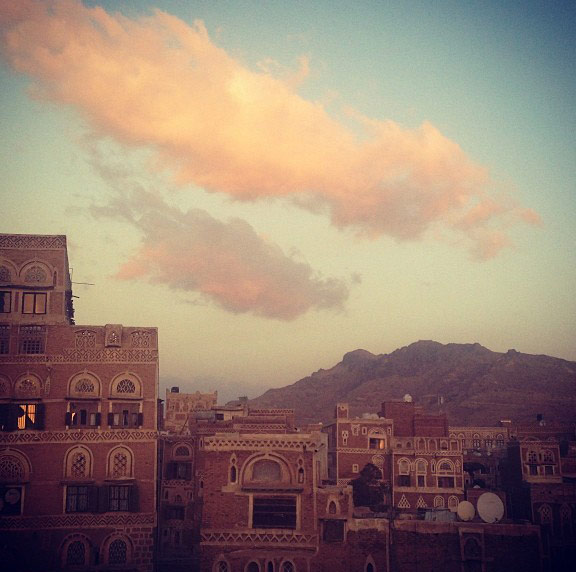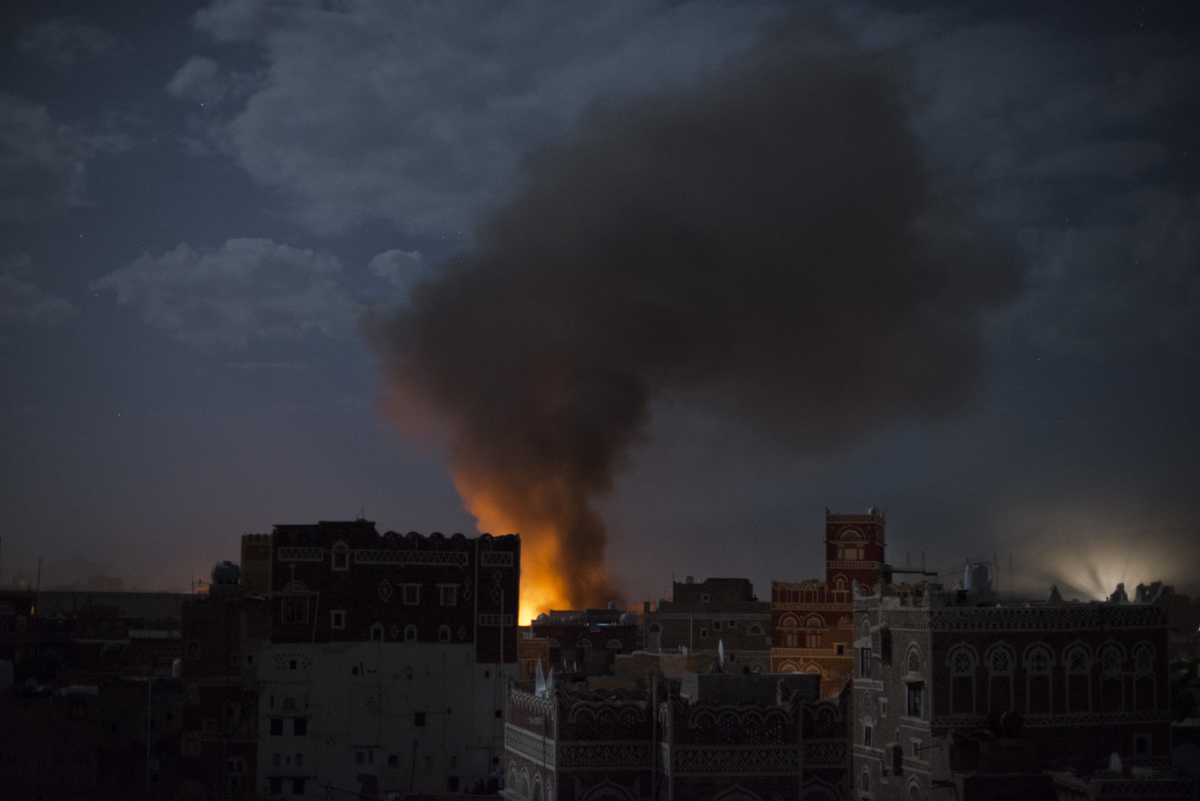
Look At This
The Unthinkable
An ancient city plunges into darkness as a war on civilians rages
Photography By Alex Potter
Aug. 21, 2015


This is one of the oldest cities in the world.

For thousands of years, it was a center of wealth, technology, culture and trade.

It’s a place where tourists would marvel at its gardens, mosques and stunning 11th century architecture.

This is Sanaa, the capital of Yemen.

Yemen is at war.

Rebels from the Houthi minority group took control of Sanaa and other parts of the country six months ago. Saudi Arabia backs the government that was forced out and has launched airstrikes against the Houthis. Other actors — al-Qaida and ISIS — make it even more complicated.

And in June, the unthinkable happened.

The densely populated Old City, where people have lived for more than 2,500 years, was attacked. Locals blamed an airstrike.

Photographer Alex Potter was there. The shell hit just a few blocks from her home.

“There was a dull thud, but no explosion, and through the rush of dust came a sound like crumbling paper, like rocks falling down a hill.”

“Neighbors poured out of their homes in the area, wearing nightgowns and slippers, heads wrapped in shawls to protect against the chill, armed with flashlights and shovels. There was no rescue crew, just dozens of men trying to pull their friends from the rubble.”

Potter was stunned to recognize her neighbors being pulled out of the rubble.
Shawki Qalala was one of them. “He was a smiling doctor; everyone in the neighborhood knew him,” she recalls. “That night, he, his three cousins and his cousin’s wife were all killed — crushed under the dust of centuries-old homes.”

“I had always told my family and friends that the Old City is safe. … No one would attack a UNESCO site.”

Potter is a nurse from a small town in Minnesota. She says she had always known that she wanted to be a journalist.

She moved to Yemen in 2012. She was 22, knew no one and had little experience with international reporting.

“I was too naive to be terrified,” she says. “I just knew they had a revolution and I felt the country was worth dedicating my time to." She saw Yemen as “a place of enthusiastic young people with a vibrant and ancient culture, and men and women who never seemed to give up hope.”
In many ways, the family-oriented culture where neighbors look out for each other felt similar to her hometown.

Things have changed dramatically since then. Some 4,500 people have been killed and more than 1 million have been forced to flee their homes.

Life is hard in Yemen. Even before the recent violence, poverty and unemployment rates were very high. But war has made day-to-day life increasingly difficult.
Electricity used to be available 12 hours or more a day. Now, it might be on for a half-hour every other day.

“The darkness is a bit unnerving,” says Potter. “We charge everything as much as we can during the day with solar panels. We have no fridge, no A/C, no heating.”

“Hardly anyone gets water to their actual house anymore,” says Potter.

She sees scenes like this every day — in the countryside and in the city. The water table is so low, farmers now need fuel to pump water from aquifers deep in the earth. “No fuel means no water, no water means no crops, no crops means no income … which leads to a growing health crisis,” she says.

13.4 million people in Yemen — half the population — lack access to safe drinking water. Even before the war, people struggled to get water.

In the city, mosques and wealthy residents — not the government — have set up public tanks to provide for their neighbors in need.

Ahmad Asaba is 18. He was sitting outside a Sanaa mosque with his brother when a car bomb, claimed by ISIS, killed two people and injured dozens. “His legs, arms and face were burned pretty badly,” Potter says. But he made a quick recovery: “Now he’s back out riding his motorcycle.”

In the north of Yemen, things are worse. Potter met this family at a school offering shelter to refugees. The family is among thousands of people who have fled to Sanaa.
“They’re just taking it day by day,” she says. “They want to go home. But they want to be safe.”

But despite the risks, many Yemenis “would rather die in their homes and suffer with their families on their own land than live an undignified and abused life as a refugee,” Potter says.
Mohsen Al Jaylani lives in a small village south of Sanaa. An airstrike killed his two sons and his nephew in July. This is their gravesite.

Doctors Without Borders has called this war a “war on civilians.”
Potter met this mother in a hospital north of Sanaa. She was too malnourished to breast-feed and couldn’t afford formula or fresh milk. Her child had been ill for weeks from spoiled milk powder.

The war has led to a rise in malnutrition. And more than 8 million Yemenis currently lack access to basic health care.

If this war had happened elsewhere, it might have caused a refugee crisis like the one in Syria. But unlike in Syria, where besieged families can flee to Turkey, Iraq, Jordan or Lebanon, Yemenis often feel trapped.

To the north are the Rub’ al Khali desert and the closed borders of Saudi Arabia and Oman. To the south are the Red Sea and the Gulf of Aden, across which lie Djibouti and Somaliland (a breakaway region from Somalia). “Neither are very hospitable to Yemeni refugees,” says Potter.

Embassies from neighboring countries have mostly closed in Sanaa. Yemenis who have left tend to be from wealthy families, who can afford expensive air travel and endure complicated visa requirements.

Potter’s friend A.Z. is one of the lucky few who were able to leave. She lived in an area of Sanaa heavily targeted by airstrikes, until she married and moved to London with her Croatian husband last year.

Potter is leaving Yemen this week, for how long she doesn’t know. She says it’s been difficult — seeing neighbors die, friends kidnapped and countless people suffering. She’s taking a break now to visit family back in Minnesota, but she says she will return. “I feel like I belong here more than in other countries.” ■

Help more people see this
Help us tell more stories like this
Does this kind of reporting matter to you?
We'd love to know why
Project Credits
Photography by Alex Potter
Written and Edited by Kainaz Amaria, Brian Boyer and Hannah Bloch
Produced by Kainaz Amaria, Tyler Fisher, Becky Lettenberger and Wes Lindamood

Up Next
A Girl Can Dream
But in Afghanistan, can dreams become reality? Take a look inside a school in Kabul.
